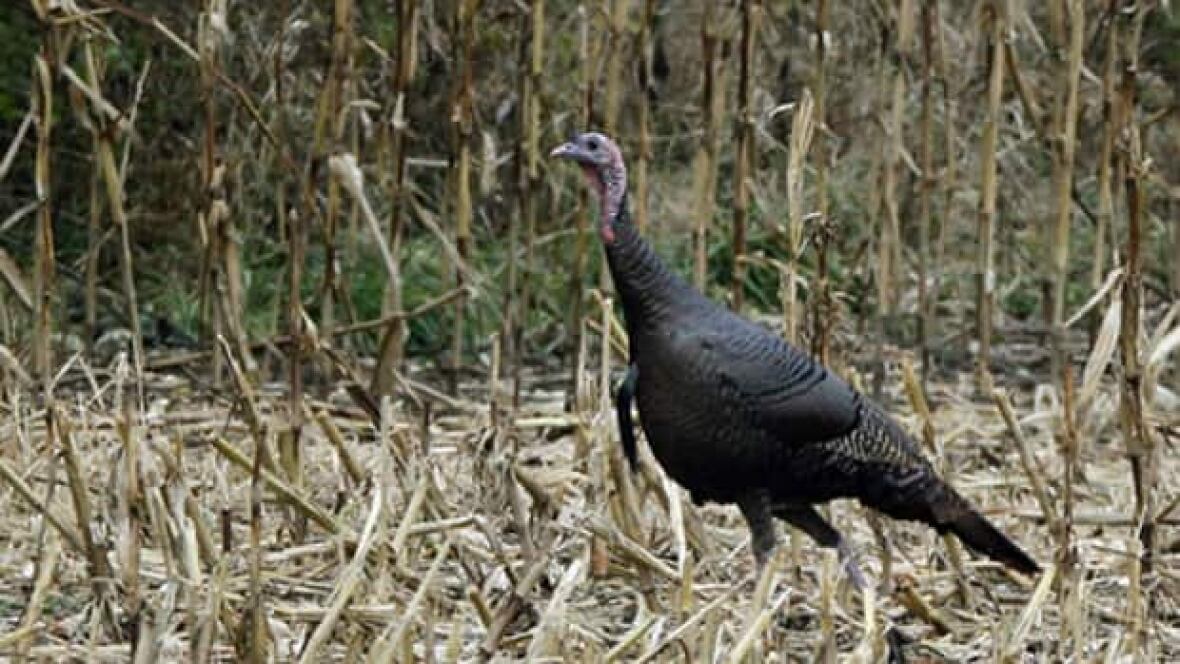Wild turkey chases members, wreaks havoc at Île-Bizard golf course
Experts say while it is rare for wild turkeys to be seen by or attack humans, they can do 'serious damage'
As members at the Elm Ridge Country Club in Île-Bizard head out to the course they may be hoping for a birdie, an eagle or even an albatross. But one bird they might not expect to see is a turkey — especially a wild one.
Yet right after Thanksgiving, a wild turkey has been spotted by several members of the club and many have said it is not friendly.
Randy Moncrieff, the general manager of the club said while he personally had not encountered the turkey, members have told him that he is large and fierce.
"My understanding is that there is a male, a very large male and a smaller female," he said. "And the male has turned into quite the aggressive fellow and actually chases our members. "
But the biggest problem Moncrieff said is that no one has been able to catch the turkey.
Too close for comfort
Jonathan Lutter Hoppenheim was on the 15th hole when he saw a small animal in the distance. At first, he thought it was cute, but as he fiddled with his bag he saw the turkey move towards him.
That's when three things became apparent: this was no small turkey, the animal wasn't in a good mood and he said "it seemed like it wanted a piece of [him]."

The wild turkey then pursued Lutter Hoppenheim. He said he tried to run and distract the turkey by waving his golf club, but it was both resilient and just as fast as he was.
The golfer then tapped the wild turkey twice, which only seemed to upset it.
"What do I do? Do I hit him?" He asked a friend as he deliberated his next moves.
No laughing matter
Lutter Hoppenheim, who describes himself as an animal lover, said he did not want to injure the wild turkey, but while looking at the large claws of the animal, he also feared for his own safety and the safety of older members at the club.
He said he hit the turkey on the side and it backed off.
Barbara Frei, the director of the McGill Bird Observatory, said it is extremely rare to see a wild turkey because they are great at hiding and it is even rarer that a turkey will attack someone.
"It was a turkey who was probably trying to establish dominance or potentially saw the person as a potential predator and was trying to scare it away," she said.
David Rodrigue, the executive director of the Ecomuseum, said the turkey could be on the golf course because it has become habituated to being around humans and that people could be feeding the bird.
There is also a small chance that the wild turkey's displaced aggression was caused by a neurological disease, he added.

While the experts stressed that turkeys do not seek out human interaction, both said they are much more developed than their domesticated sisters.
"They are very well equipped for fighting," said Rodrigue.
When male turkeys fight in the wild, they will fan out their feathers and proceed to make a drumming sound.
The wild turkeys have a pecking order and in order to assert dominance they will peck or claw at one another with their large talons.
In the unusual case where a turkey attacks a human, its claws had potential to "do some damage," said Rodrigue.
The plight of the wild turkey
The wild turkey is a native species in Quebec, according to Rodrigue.
About 20 years ago, there were only three to four breeding pairs left in the province, in the Hemmingford and Covey Hill area.
The dilemma made the provincial government reintroduce turkeys to the area by bringing the breed from Northern New York to Southern Quebec.
The birds have been able to re-establish themselves beautifully, said Rodrigue.
They have even been spotted in Shawinigan, about 230 kilometres north of where the once endangered animals were reintroduced.
What to do if you are attacked by a wild turkey
Frei had the following suggestions for people in the rare case that they are attacked by a turkey:
- Make yourself as big a possible.
- Wave your hands and speak in a loud voice.
- Do not run because turkeys can run up to 40 kilometres an hour.
While that should be enough to make the turkey stop, if the intimidation persists:
- Wave something at the turkey.
- Be prepared to fight if things escalate.

